Tata Motors Acquisition Of Iveco To Create A CV Behemoth, India’s Frugal Engineering Meets European Tech
- By Nilesh Wadhwa
- July 31, 2025
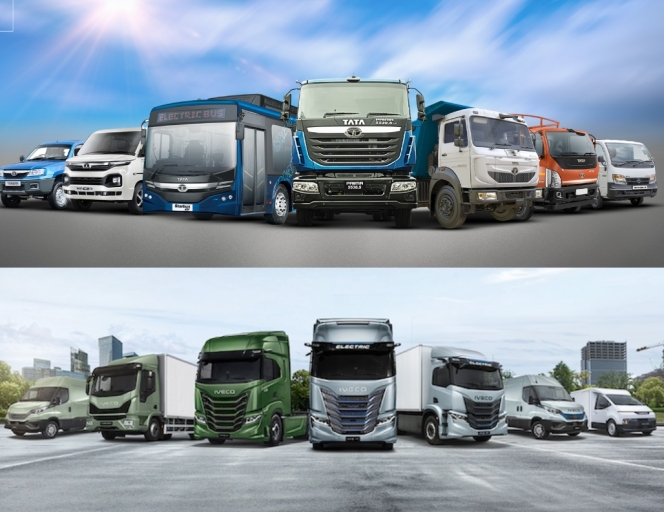
It was on 30 July 2025, Tata Motors announced it had reached an agreement with European automaker Iveco Group to acquire its commercial vehicle, powertrain and finance business for EUR 3.8 billion. The transaction to be financed through a mix of equity and debt will complement Tata Motors’ frugal engineering and robust product portfolio with Iveco Group’s global product portfolio, technology and ecosystem.
Tata Motors expects to raise around EUR 1 billion through equity, along with monetising its stake in Tata Capital to help repay the EUR 3.8 billion bridge loan to acquire Iveco Group.
The new company will be able to drive better operating leverage by spreading its capital investments over larger volumes, generating important efficiencies and reducing the cash flow volatility inherent in the commercial vehicles sector. It will also enable the capabilities of Iveco Group’s successful powertrain business, FPT, to be further enhanced.
Explaining the rationale behind the move, P B Balaji, Group CFO, Tata Motors, stated that the commercial vehicle business is different from the passenger vehicle business.
“CV segment sees steady business; the disruption levels are slow and gradual. They are not very intense, and it takes a lot of time to build the brand presence, establish a financing arm, market products; therefore only way to grow substantially through inorganic means becomes part of the milestone,” he said.
Tata Motors has been working on splitting its passenger vehicle business and commercial vehicle business, with the CV business expected to be listed as an individual entity in October 2025.
Together with this move, the new combined entity, Balaji stated, will create the “world’s fourth largest CV maker and in touching distance of the number 2 and 3 in the above 6-tonne category.”
He revealed that the discussions with Iveco had been ongoing for the last six months, since the latter decided to spin it off its defence business.
“Tata Motors had never been financially strong enough to take such a move, with Iveco deciding to spin-off its defence business, one has to move very fast to diversify the portfolio and grow CV business,” he said.
The acquisition involves Iveco’s four business operations – Trucks, Buses, FPT Industrial (engine) and Iveco Capital (financing).
Together, the partners will not only complement product portfolios and capabilities but eventually benefit from substantially no overlap in their industrial and geographic footprints, creating a stronger, more diversified entity with a significant global presence and sales of over 540,000 units per year. Together, Iveco and the commercial vehicle business of Tata Motors will have combined revenues of EUR 22 billion split across Europe (50 percent), India (35 percent) and the Americas (15 percent) with attractive positions in emerging markets in Asia and Africa.
Unlimited Pathways 2.0
In what is described as the next frontier of growth for the combined entity, Balaji revealed that they will co-develop a joint roadmap christened ‘Unlimited Pathways 2.0’, which aims to define new technology-led synergy initiatives once the transaction closes in April 2026.
This is said to ‘lift the ambition for both companies to a very different level’, along with clearly defining cross-border synergies.
As per Balaji, the return on capital employed (ROCE) for the combined entity will stabilise at 20 percent, with room to grow earnings significantly. At present, for Tata Motors, the ROCE is around 40 percent, while for Iveco it is 14 percent.
“Together we believe we can actually generate substantial value, we can triple our revenue and quadruple some of our profitability numbers amongst the two of us to ensure that it still generates a 20 percent kind of a ROCE,” said Balaji.
Tata Motors, on its path, will benefit from access to Iveco’s advanced investments in the areas of technology, alternative energy, which the Indian CV market has not yet seen in a big way.
“The brand is complementary, therefore customer groups/cohorts which we were not addressed with Tata Motors brand, can now essentially be addressed with Iveco, that is the premium end of the market. Secondly, the frugal engineering capabilities we have in India, will certainly be of help for Iveco to optimise and bring design to value thinking. Thirdly, Iveco has been invested ahead of time, as in what India has been doing on various technologies, be it powertrain, software-defined vehicles (SDVs) and ADAS, among others. These are some of the technologies that we can adopt for the Indian market ahead of time, and at the same time bring in frugal engineering that will help Iveco in turn,” explained Girish Wagh, Executive Director, Tata Motors.
He further stated that the idea is to work together and complement each other wherever possible. “As we go ahead, we will put mechanisms and thoughts in place, and how we can synergies and govern the entities as ‘one Tata Motors commercial vehicle’.”
Adding to that, Balaji stated, “We also want to be sure that there will be specific areas for sure, where we would like to keep it as different as each other, as part of our learning from the Jaguar Land Rover experience. Iveco brand, the channel, we would want it to be absolutely independent, where there are two different markets it serves. But there are areas where they may overlap. And as we understand each other, the overlap will increase, but it is first important to understand each other, get the cultural sensitivities taped up between the two companies, and build the trust. At the end of the day, it is the excitement of winning together that is the first focus, and we will do it in a measured manner together with Iveco team. Engaging with them for the last six months, the mutual chemistry is excellent in ensuring that we co-create the agenda together. So that we can start lifting the ambition for both companies to a very different level.”
Sharing his expectations from unlocking the combined synergies, Balaji stated “A lot of people are seeing this as 2 + 2 together, if that is just going to be 4, we have a problem. I would want to see how this can translate to a 6 or a 8 or 20 if we can pull it off,” emphasising his significant expectations from the behemoth.
Existing partnerships to continue
Tata Motors and Iveco have established their brand over the years, the network, the supply chain and partnerships. Despite the announcement, there are still a lot many areas where decisions have yet to be made.
In India, Iveco, through FPT Industrial, is supplying LNG engines to Pune-based Blue Energy Motors, in which the company also has acquired a minority stake. Responding to a query on whether Tata Motors is looking to use Iveco’s LNG powertrains for its products, Balaji said that there were a lot of areas where they are still trying to figure out the future course of action.
Adding to that Wagh said, “There are possibilities for powertrain synergies with Iveco, but we have a very strong and long-lasting partnership with Cummins in India for powertrains for more than 33 years. We use their engines, especially in medium and heavy commercial vehicles and will continue to do so. In addition, we also formed a step-down JV to accelerate our efforts towards zero zero-emission solution – hydrogen ICE, hydrogen fuel cell or battery electric. We will continue to work on that. There are also products in our portfolio, where FPT Industrial has powertrains in both ICE diesel and gaseous fuels. We will certainly explore the synergies, which will improve the competitiveness of our products in these markets.
Tata Motors also confirmed that as part of the deal, it will get access and nurture all the IPs, capabilities, and design from Iveco, including cabin partnership and fuel-cell with Hyundai.
Going forward, the partnership is expected to see Tata Motors introducing Iveco products in India and other markets where it has a strong geographical presence, while it will utilise Iveco’s ecosystem to introduce Tata Motors’ range of CVs.
GST Rationalisation, Customer Sentiment Power Ashok Leyland’s Record Performance In Q3 FY2026
- By MT Bureau
- February 11, 2026
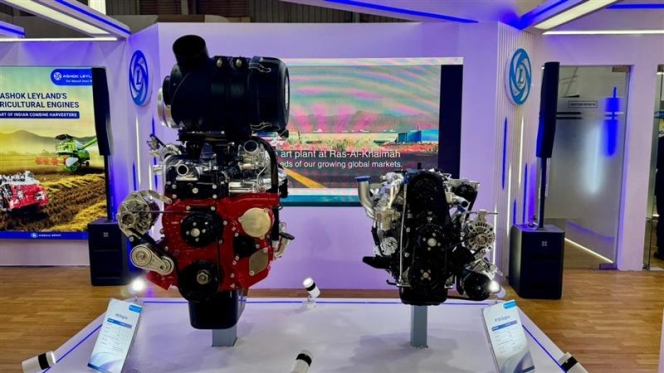
Chennai-headquartered commercial vehicle major Ashok Leyland has reported its financial results for Q3 FY2026, achieving its best-ever performance for the period.
The company reported a record INR 115.34 billion in revenue, up 22 percent YoY, as compared to INR 94.79 billion for the same period last year. EBITDA margin at 13.3 percent came at INR 15.35 billion, as against 12.8 percent at INR 12.11 billion, clocking a growth of 27 percent YoY. This also marked the 12 consecutive quarter of achieving double-digit EBITDA growth.
Net profit at INR 7.96 billion, grew by 4 percent YoY, which also includes a one-time charge of INR 3.08 billion towards the new labour code.
During the quarter, the company sold 32,929 M&HCVs, up 23 percent YoY and 20,518 LCVs, up 30 percent YoY. Exports came at 4,965 units, as against 4,151 units last year. This translates to a 30 percent market share in the M&HCV segment, and 40 percent in the Bus segment.
Ashok Leyland reported net cash of INR 26.19 billion at the end of Q3 FY2026, as against INR 9.58 billion last year.
The company also recently reintroduced the all-new Hippo and Taurus product range in the tipper and tractor-trailer segments.
Dheeraj Hinduja, Executive Chairman, Ashok Leyland, said, “Market conditions continue to be favourable, and we are optimistic that this strength will sustain in the medium term across all our businesses, including MHCV, LCV, and Defence. Our strong and consistent growth in volumes and profitability underscores the competitiveness of our portfolio, which delivers superior performance and customer value, reinforced by deep and effective customer engagement across all segments. We are executing a structured pipeline of product introductions across conventional and alternative propulsion platforms to further strengthen our leadership in the domestic market and accelerate our expansion in international markets. Our electric vehicle arm, Switch, has a healthy order book and a well-defined product roadmap. It has started delivering buses in International markets and has achieved positive EBITDA and PAT over the first nine months.”
Shenu Agarwal, Managing Director & CEO, Ashok Leyland, added, “The GST rationalisation has not just lowered prices, but also brought a fillip to the overall freight demand, triggering fresh replacement cycle in the CV industry. With supportive macroeconomic fundamentals and improving customer sentiment, we remain confident about the medium to long-term growth prospects of the CV industry. Our strategy continues to be anchored in delivering profitable growth through sustained product premiumisation, structural cost competitiveness, wider service coverage, and continued focus to grow non-CV businesses. “
Tata Motors Indonesia Secures Order For 70,000 CVs
- By MT Bureau
- February 10, 2026
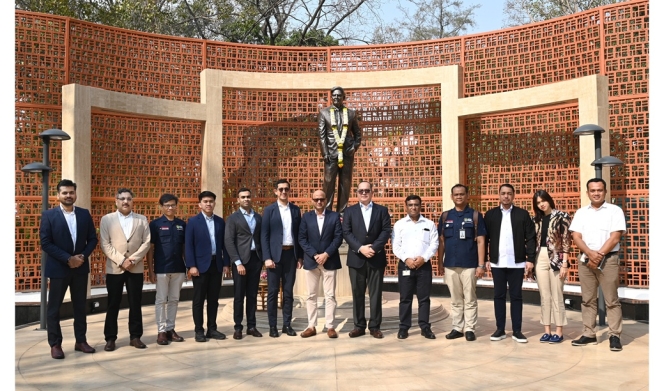
PT Tata Motors Distribusi Indonesia, a subsidiary of Tata Motors, has entered into an agreement to supply 70,000 vehicles for deployment in Indonesia. The fleet will support agricultural activities, rural logistics and regional goods movement.
The order consists of 35,000 units of the Yodha pick-up and 35,000 units of the Ultra T.7 truck. These vehicles will be delivered to PT Agrinas Pangan Nusantara, an Indonesian state-owned enterprise tasked with modernising agricultural supply chains and advancing food security.
The vehicles are part of the Koperasi Desa and Kelurahan Merah Putih Project, a strategic initiative aimed at strengthening rural connectivity and economic resilience in Indonesia. The fleet will be distributed through agricultural cooperatives under a phased delivery programme to ensure integration into the national logistics network.
Asif Shamim, Director, PT Tata Motors Distribusi Indonesia, said, “This order reflects the continued acceptance of Indian commercial vehicles in international markets and the confidence of customers in their ability to operate reliably across diverse conditions. The Tata Yodha and the Ultra T.7 are designed for sustained performance, high uptime and efficient operating economics. Their deployment will support agricultural logistics in Indonesia by improving connectivity, enabling more efficient movement of goods across rural and regional networks. We remain committed to expanding the global footprint of Indian mobility solutions through vehicles and offerings that combine scale, reliability and sustained value creation for our customers.”
- Switch Mobility
- Switch EiV12
- Ganesh Mani
- CESL
- Convergence Energy Services
- Hinduja Group
- Ohm Global Mobility
Switch Mobility Deploys 272 Electric Buses In Delhi
- By MT Bureau
- February 09, 2026
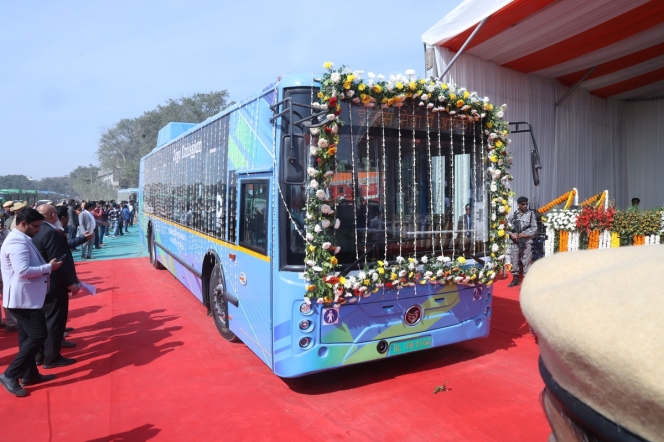
Switch Mobility, the electric vehicle arm of the Hinduja Group, has flagged off 272 units of its EiV12 low-floor bus in New Delhi. The deployment is part of a 950-bus contract awarded under the Convergence Energy Services (CESL) tender.
The event, held at Ramlila Maidan, was led by the Chief Minister of Delhi, Rekha Gupta, alongside transport officials and representatives from the Delhi Transport Corporation (DTC). The rollout aligns with the Government of India’s targets for emission-free and accessible public transport.
The 950 e-buses will be stationed at depots across the capital, including Okhla Srinivas Puri, Grand Trunk Road, and Rajghat. Ohm Global Mobility will manage the operational deployment and maintenance of the fleet.
The vehicles are manufactured at Switch Mobility's facility in Tamil Nadu. The project aims to increase the volume of electric buses in operation in Delhi to reduce CO2 emissions and improve urban air quality.
The Switch EiV12 is designed for urban transit with a focus on accessibility and stability. It gets ultra-low entry with kneeling and tilting functions to assist boarding. Floor-mounted batteries for stability and rear-mounted ports supporting dual-gun fast charging.
It features manual/automated wheelchair ramps for passengers with special needs, seniors and parents with prams. The Switch iON system monitors 140 parameters with 80 alerts to track vehicle health and performance.
Ganesh Mani, Chief Executive Officer of Switch Mobility, said, "The flag-off of over 200 Switch EiV12 Low Floor Buses electric buses in partnership with CESL is a significant milestone in strengthening Delhi's electric public transport ecosystem. Switch Mobility is committed to collaborating with city transport authorities to deliver dependable, high-performance electric buses that can scale rapidly. Deployments like these demonstrate how electric mobility can be seamlessly integrated into urban operations while delivering tangible benefits in emissions reduction and passenger experience."
- GreenCell Mobility
- electric bus
- International Finance Corporation
- IFC
- British International Investment
- BII
- Tata Capital
- Devndra Chawla
GreenCell Mobility To Deploy 570 Electric Buses In Delhi
- By MT Bureau
- February 09, 2026
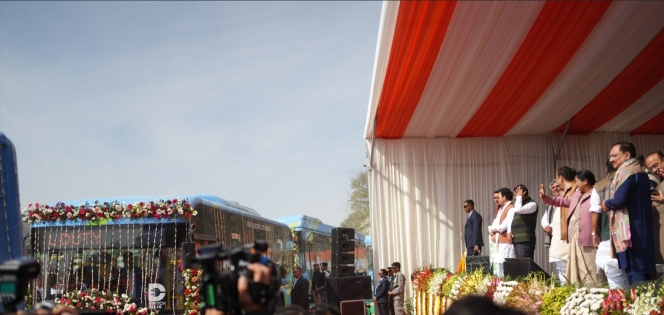
GreenCell Mobility (GCM) has announced the deployment of 570 electric buses in Delhi to expand the city's zero-emission public transport. The initiative follows an USD 89 million investment round from the International Finance Corporation (IFC), British International Investment (BII) and Tata Capital.
The deployment began with a recent event at Ramlila Maidan, where 500 electric buses were introduced by the Delhi Government.
GreenCell Mobility will supply 12-metre, air-conditioned buses featuring batteries designed for Delhi's road conditions. The vehicles will operate from depots in Rajghat, Dilshad Garden and Seemapuri.
The e-buses come with an Integrated Transport Management System (ITMS), real-time vehicle tracking and internal and reversing cameras. It also is equipped with Passenger Information Systems and infrastructure for differently-abled commuters.
Beyond the capital, GreenCell Mobility is executing projects across several states including 700 buses Uttar Pradesh, 750 buses in Andhra Pradesh, 582 buses in Madhya Pradesh, 400 buses in Bihar and 50 intercity buses for MSRTC in Maharashtra.
Backed by Eversource Capital, GCM currently operates a fleet of over 1,200 electric buses supported by 270 charging stations. Following the recent funding, the company plans to scale its total fleet to over 3,700 electric buses under the National E-Bus and PM Seva E-Mobility programmes.
Devndra Chawla, MD & CEO, GreenCell Mobility, said, “Delhi’s electric bus rollout represents the next phase of India’s public transport transition from pilots to scaled, city-wide adoption. This deployment showcases how institutional capital, policy intent and operational capability can come together to deliver clean mobility at scale. Our focus is not just on adding electric buses but on building a reliable, technology-led public transport ecosystem that cities can depend on over the long term.”







Comments (0)
ADD COMMENT